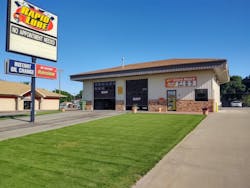Between the years of 2005 and 2018, the town of Huron, South Dakota, underwent a major demographic shift.
By a percentage of its population of nearly 19,000, Huron took in more immigrants in these years than any other city in the United States. A large portion of these immigrants came from the Karen (kuh-REN) region of Myanmar, which was formerly Burma.
Following persecution in Myanmar, around 2,000 Karen people made their way to Huron, South Dakota seeking peace and stability. While some citizens of Huron were hesitant at first, the city then accepted their new neighbors with open arms.
One way that Lee Christianson, owner of Lee’s Rapid Lube, responded was to include bilingual services within six months of purchasing the store in 2009.
Christianson recounts how he conceived and carried out this initiative for the benefit of his customers and his shop.
The Choice
Christianson purchased the shop in April of 2009. When he took over, there were no bilingual services being offered.
“I am the only quick lube shop in Huron and really within a 50-mile radius of the town,” Christianson says. “And I would hardly see any Karen people coming to my shop.”
This perplexed Christianson because he would drive around town and see Karen people in many other stores. Forcing him to wonder where they were getting their oil changes.
“I realized that I wasn’t reflecting my community at my shop. So within six months of ownership, I decided to start offering bilingual services,” Christianson says.
At the time Christianson’s son, Tyler, was in high school and he had many Karen classmates, giving Christianson a great idea. He paid a visit to the school’s vocational teacher and asked if any Karen students were looking for a job.
“I gave the teacher my business cards and told him to direct any interested Karen students in my direction,” Christianson says.
Within a few weeks, Christianson had hired two high schoolers who could speak English and the Karen language.
The Services Offered
There are many aspects that need to be considered when offering bilingual services to a population that speaks two or more languages.
“The first is that you need to have at least one person on staff that can interact with customers in their preferred language,” Christianson says.
Since hiring on those two high schoolers in 2009, Christianson has continuously hired more native Karen speakers to fill this role. Currently, Christianson employs two Karen speakers, Po Dah and Eh Jo Ah, to help with the front desk to bridge the language barrier between the shop and the community.
“In addition to having fluent speakers on staff, we also consulted with a Karen translator to have all of our services converted to that language,” Christianson says.
The shop offers a menu board displaying all of their services in the Karen language. This provides the quickest access to the service menu and helps out in the event that both of the Karen speakers are not on shift.
Community-Accessible Business Models
The bottom line for Christianson is that the business should cater to the market, not the other way around.
“The most important aspect about offering bilingual services and employing people from all backgrounds is having a workforce that reflects your community,” Christianson says.
Having a workforce that reflects your community implicitly and explicitly communicates that you care about offering your services to everyone, Christianson says.
“We accomplish this by ensuring that my bilingual employees can do everything that I can, maybe even more,” Christianson says.
They are trained to bill customers out, run the computers, work on cars, and run the front desk if needed.
Christianson’s shop strives to demonstrate that they take care of all of their customers and that they cater to everyone in their community.
“The Karen community makes up a pretty good portion of our population,” Christianson says. “They need someone to take care of their preventative maintenance needs.”
The shop also accomplishes this by ensuring that their print advertising has a sentence or two in the Karen language.
“While I don’t normally run print advertising, just once or twice a year, I always ensure that it is summarized in the Karen language on the ad,” Christianson says.
The Benefits of Bilingual Services
Christianson says that offering bilingual services was probably one of the best business decisions he had ever made.
“Before I first started offering these services I would typically only see a few Karen customers, but nothing substantial,” Christianson says.
The transition did not happen overnight, Christianson said that it took six to eight months, but when word got out about Christianson offering bilingual services, more and more Karen people started going to him. Now, he says that customers from that group make up 25 to 30 percent of his business—instrumental to his success, he says.
According to Christianson, the Karen community prefers word-of-mouth advertising over other forms. Employing members of their community for more than a decade has made a large impact on his shop.
Christianson has created a shop that takes the guesswork out of providing services to a population that speaks another language.
“People feel more comfortable going to a place where they can relate to and talk to someone directly in their own language,” Christianson says.
